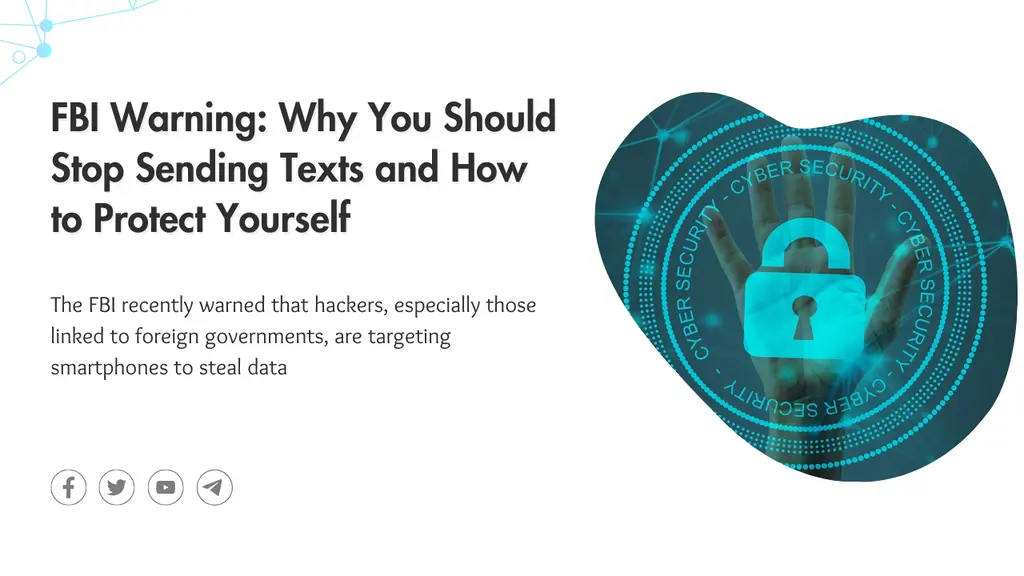FBI Warning: Why You Should Stop Sending Texts and How to Protect Yourself
FBI Warning: In today’s world, your text messages might not be as private as you think. The FBI recently warned that hackers, especially those linked to foreign governments, are targeting smartphones to steal data. If you use text messages without proper security, you could be at risk.
But don’t worry — protecting yourself is easy. This article will explain the FBI’s warning, why texting is unsafe, and how you can keep your messages secure.
What’s the FBI Warning About?
The FBI and the Cybersecurity and Infrastructure Security Agency (CISA) revealed that Chinese state-linked hackers are targeting telecom systems. They are stealing:
- Metadata: Information like who you text and when.
- Content: The actual messages and even phone call recordings in some cases.
The risk is bigger for people who rely on unencrypted text messages — the default method on many phones. If a hacker intercepts these texts, they can easily read them.
Why Are Text Messages Unsafe?
Most text messages sent using default apps on your phone are not encrypted. This means:
- Your messages travel as plain text.
- If hackers intercept your messages, they can read or steal them.
End-to-End Encryption solves this problem. With encryption:
- Only the sender and receiver can read the message.
- Hackers (and even tech companies) cannot access it.
Which Texting Apps Are Secure?
If you’re using iMessage (Apple’s default app) or apps like WhatsApp or Signal, your texts are safe because they use end-to-end encryption.
Here’s a quick breakdown:
- WhatsApp
- End-to-end encryption by default.
- Works on both Android and iPhones.
- Signal
- The gold standard for secure messaging.
- It’s free, private, and easy to use.
- iMessage (Apple)
- End-to-end encrypted but only between iPhone users.
- If you text an Android phone, messages aren’t secure.
- Google Messages
- Offers encryption, but only when both sender and receiver use the feature.
Steps to Protect Your Messages
- Stop Using Regular Text Messages (SMS)
Use encrypted messaging apps like Signal or WhatsApp instead. - Enable Two-Factor Authentication (2FA)
Hackers often steal text message codes for 2FA. Use apps like Google Authenticator or Authy for safer verification. - Keep Your Phone Updated
Always install software updates. These updates fix security issues that hackers could exploit.- Go to Settings > Software Update on your phone and enable automatic updates.
- Understand Your Risks
Think about what’s on your phone:- If you’re a journalist, businessperson, or activist, you need stronger security.
- For everyday users, encrypted apps offer great protection against cybercriminals.
Why Is This Happening Now?
The recent hacking cases show how advanced cybercriminals have become. For example:
- Hackers linked to China broke into U.S. telecom systems.
- They stole massive amounts of data, and in rare cases, the actual content of messages and calls.
This is a wake-up call for all smartphone users. Your private conversations are valuable — and worth protecting.
Read Also: How to Use the New AI Image Generator in Apple Playgrounds
Conclusion: Stay Secure with Simple Steps
The FBI’s warning might sound alarming, but protecting your messages doesn’t have to be hard. Switch to encrypted messaging apps like Signal or WhatsApp today.
Also, remember to enable two-factor authentication using an app and keep your phone updated. These small changes will keep your private messages safe and secure.
Note: Take Control of Your Privacy Today.
Stop using insecure text messages and switch to encrypted apps. Your conversations deserve the best protection.

